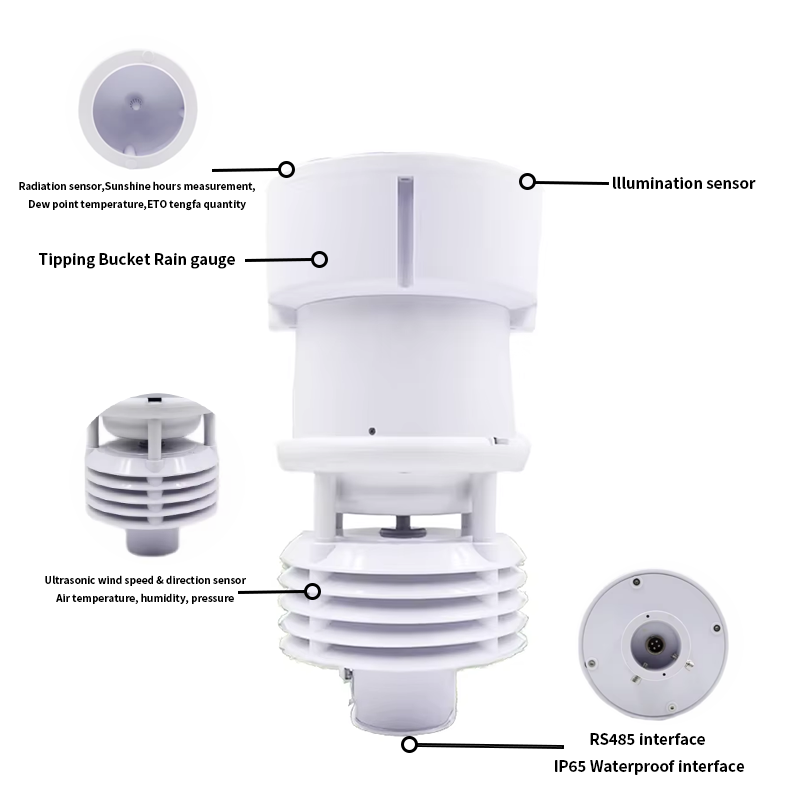Recently, many countries and regions have completed the installation of advanced agricultural meteorological stations, marking an important step in the construction of a global agricultural meteorological monitoring network. These weather stations will provide local farmers with accurate meteorological data, helping to improve agricultural production efficiency and sustainable development.
In the context of increasing global climate change, the stability and sustainability of agricultural production is facing unprecedented challenges. In order to cope with this challenge, many countries and regions have actively promoted the construction of agricultural meteorological stations in order to guide agricultural production, optimize resource allocation, and improve crop yield and quality through accurate meteorological data.
1. United States: Smart weather stations help precision agriculture
In the main agricultural producing areas of the Midwestern United States, multiple intelligent agricultural weather stations have been officially put into use. These weather stations are equipped with advanced sensors and data analysis systems that can monitor key meteorological parameters such as temperature, humidity, precipitation, wind speed, wind direction and soil moisture in real time. By combining with satellite remote sensing technology and Internet of Things equipment, these weather stations can provide accurate weather forecasts and crop growth environment monitoring data, helping farmers formulate scientific irrigation, fertilization, and pest and disease control plans.
The local agricultural department stated that the installation of these smart weather stations will significantly improve the level of refined management of agricultural production and is expected to save farmers a large amount of water and fertilizer inputs every year, while improving crop yield and quality.
2. Australia: Meteorological data helps combat drought and reduce disasters
In Australia, the construction of weather stations has also achieved remarkable results. As Australia faces long-term droughts and extreme weather, the stability of agricultural production has always been a problem. To this end, the Australian government has teamed up with a number of scientific research institutions to install hundreds of agricultural meteorological stations across the country.
These weather stations can not only monitor meteorological data in real time, but also have powerful data analysis and early warning functions. Through the analysis and modeling of historical meteorological data, weather stations can predict drought and extreme weather events in advance, provide farmers with timely warning information, and help them take effective response measures. For example, after a drought warning is issued, farmers can adjust planting plans in advance, select drought-tolerant crop varieties, or adopt water-saving irrigation measures to minimize losses.
3. India: Weather station construction promotes agricultural modernization
In India, the construction of agricultural meteorological stations is regarded as an important measure to promote agricultural modernization. In recent years, the Indian government has vigorously promoted the “smart agriculture” plan, of which the construction of agricultural weather stations is an important part.
At present, India has installed advanced agricultural meteorological stations in many major agricultural production areas. These weather stations can not only provide accurate meteorological data, but also directly connect with local agricultural cooperatives and farmers to provide personalized agricultural technology consulting services. . For example, under the guidance of weather stations, farmers can better grasp the best times for sowing, fertilizing and harvesting, thereby improving agricultural production efficiency and economic benefits.
4. Future prospects: Construction of global agricultural meteorological monitoring network
With the increasing impact of global climate change on agricultural production, the construction of agricultural meteorological stations is particularly important. In the future, countries will further increase investment in promoting the construction of agricultural meteorological monitoring networks and gradually achieve global meteorological data sharing and collaboration.
Experts point out that the construction of agricultural meteorological stations will not only help improve agricultural production efficiency and risk resistance, but also provide a strong guarantee for global food security. Through accurate meteorological data and scientific agricultural production management, global agricultural production will develop in a more efficient and sustainable direction.
The construction of agricultural meteorological stations is an important step in the global agricultural modernization process. Through accurate meteorological data and scientific agricultural production management, farmers in various countries will be able to better cope with the challenges brought by climate change and achieve sustainable development of agricultural production. In the future, with the continuous advancement of technology and the deepening of global cooperation, agricultural meteorological stations will play an increasingly important role in global agricultural production.
Post time: Nov-15-2024


